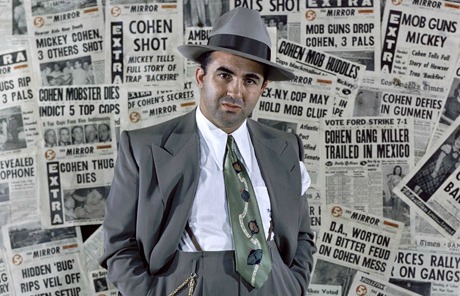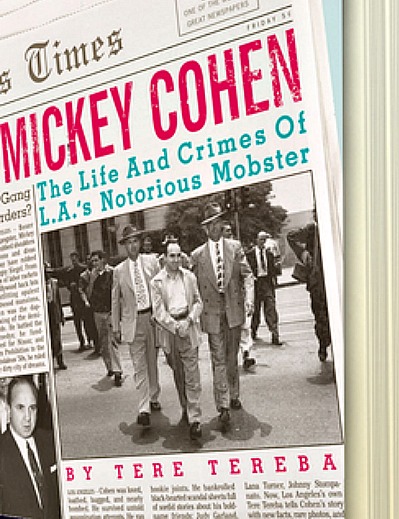A homework assignment that I’ve been dreading due to sheer laziness has to be done — an appraisal of Tere Tereba‘s “Mickey Cohen: The Life and Crimes of L.A.’s Notorious Mobster,” which has been out since May 1st. It covers Cohen’s entire life (9.4.13 to 7.29.76)…well, from age six on…and offers plenty of shoe-leather detail and minutiae up the wazoo.

Gangster Mickey Cohen, taken sometime in 1953.
The tone of Tereba’s prose is somewhere between excitedly neutral and half-admiring, and that’s a little odd, I must say. But that’s what happens, I suppose, when you write about a famous sociopath. You either get into Cohen’s head and accept that scuzball attitude, or you write disapprovingly like you’re Jack Webb or J. Edgar Hoover. Or you find some kind of objective middle ground,
The research and writing ate ten years of Tereba’s life, and I certainly respect that commitment. Her writing isn’t elegant, but it’s servicable enough. And the story is entertaining (as gangster sagas always are) and timely, of course, with Ruben Fleischer‘s The Gangster Squad, a “get Mickey Cohen” melodrama in the vein of Brian De Palma‘s The Untouchables, opening on 10.19.
One of the similarities is that both films fudge historical fact, or so it would appear in the case of The Gangster Squad.
The real-life Gangster Squad, led by John O’Mara (Josh Brolin in the film) and Sgt. Jerry Wooters (Ryan Gosling) never really got Mickey Cohen any more than the real-life Untouchables got Al Capone. Capone and Coen both did prison terms for income tax evasion, and were therefore “brought down,” so to speak, by federal agents. It may be that the Gangster Squad funnelled information that aided in Cohen’s first income tax conviction (he did two separate prison stretches), but they didn’t nail him in any heavy dramatic way, or not as I understand.
So The Gangster Squad is not a “get Mickey Cohen” movie as much as a “make a lot of noise and look cool and sexy and studly while trying to get Mickey Cohen” movie. Unless Beall’s screenplay makes up a phony ending. I’m basically expecting a general hodgepodge of Untouchables, Public Enemies, L.A. Confidential and Mulholland Falls.
“A movie is always fiction,” Tereba says. “I’ve written a definitive non-fiction book.”
Will Beall‘s Gangster Squad screenplay is based on Paul Leiberman‘s 2008 seven-part L.A. Times series titled “L.A. Noir: Tales From The Gangster Squad.” A book version will appear on 10.2.12, or about two weeks before the film opens.
The climactic finale in Lieberman’s seven-part series is the shooting of Jack “The Enforcer” Whalen at a San Fernando Valley restaurant called Rondelli’s, which happened while Cohen dined nearby with his crew and his bulldog. Whalen isn’t listed as a character in the Gangster Squad‘s IMDB rundown, but this incident is presumably depicted in the film. It’s certain, however, that while Cohen was tried for complicity in Whalen’s killing and O’Mara testified at this trial about Cohen’s guns having been found in a garbage can near the scene, Cohen was never convicted. (Sam LoCigno confessed and wound up going to jail for the shooting.)
Tereba and Liberman’s work will be competing with three other books about Cohen — “Mickey Cohen, In My Own Words: As Told to John Peer Nugent” (1975), “Hollywood’s Celebrity Gangster, The Incredible Life and Times of Mickey Cohen” by Brad Lewis (2009) and “King of the Sunset Strip: Hangin’ with Mickey Cohen and the Hollywood Mob” (2006) by Steve Stevens and Craig Lockwood.
When I spoke with Tereba the first thing I wanted to know was whether she’s read the Gangster Squad script, and if so, what parts are fictional and what parts aren’t?
Her first response to the script question was “I may have [read it],” but then she backed off and said she hadn’t read the script and that she has no idea what the film will contain or omit, and that she’s looking forward to seeing the film with a container of popcorn like everyone else. I find it inconceivable that a person who worked as hard as Tereba did on her book wouldn’t make a point of snagging the Gangster Squad script so she could speak with a degree of authority about the scripted content during interviews. I told her she’d be wise to get hold of a copy and read it so she won’t sound disingenuous the next time somebody like me asks.
“Do you think Warren Beatty and Barry Levinson‘s Bugsy was all fiction?,” I asked. Tereba replied that Benjamin Siegel was sitting on a couch with another guy in his Beverly Hills home when he was shot to death, and that the film left this guy out. She also said that Cohen (played by Harvey Keitel in the film) was “part of the conspiracy” to have Siegel rubbed out.
I can’t keep doing this. I could go on and on and on. I could talk about the women that Cohen allegedly had. Or how Harvey Keitel’s head was half-shaved to mimic Cohen’s appearance in Bugsy, and how Sean Penn, who plays him in The Gangster Squad, has kept his full head of hair…fuck it, I’ll do whatever the fuck I want, like Cohen did.
Tereba isn’t exactly your standard book-author type. She’s been a fashion designer since the late ’60s. She knew and hung with Jim Morrison and his girlfriend Pamela way back when, and was in Paris when he died. (Or had just been there or something.) She had a role in Andy Warhol’s Bad (’77). And she has some kind of honky accent that leads her to pronounce “Cohen” like “Cohn,” as in Harry.
Was Mr. Mickey’s name not spelled C-O-H-E-N, and was it not a two-syllable thing? “It’s just the way I talk,” she answered.

